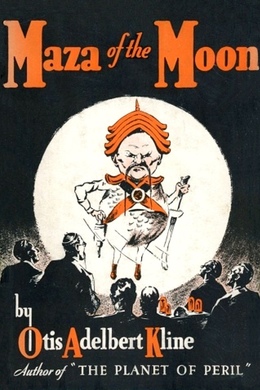
-
EPUB 243 KB
-
Kindle 281 KB
-
Support epubBooks by making a small $2.99 PayPal donation purchase.
This work is available for countries where copyright is Life+70 or less.
Description
This astonishing science-fiction classic begins like a prophecy of today’s space achievements–a missile is fired from Earth to hit the surface of the Moon. It is successful and the misslemen are heroes, until…the Moon fires back! Terrible Lunar missiles blast New York, London, and Paris. And an ultimatum is delivered from the unsuspected civilization of our satellite: ‘You have attacked us! You will pay the penalty!’ Maza of the Moon is a novel of adventure, daring and heroism as a lone Earthman invades the Moon to find out the truth and save his world.
197 pages with a reading time of ~3 hours (49340 words), and first published in 1930. This DRM-Free edition published by epubBooks, 2016.
Community Reviews
There are currently no other reviews for this book.
Excerpt
“We’ve got to win that reward, Roger, or close up shop.” Ted Dustin, youthful president and general manager of Theodore Dustin, Inc., reached mechanically for his tobacco pouch, filled his black briar, and sighed. Roger Sanders, assistant to the president, deposited his sheaf of papers on his desk, closed the door to the private office, and sat down in the chair facing his superior. “You mean–?” “I mean,” replied Dustin, flicking his lighter with his thumb, “that in order to prepare the projectile for launching, we’ve spent every cent we had, and borrowed a lot besides. Theodore Dustin, Inc., is flat broke, and the plant is mortgaged from roof to drains. If we don’t win that reward our creditors will be picking our bones in thirty days.” “Mr. Dustin.” A female voice, apparently issuing from empty air, spoke his name. He turned to the radiovisiphone, a plain looking disc resting on a small pedestal at his elbow. It was wireless, and contained no buttons, levers or controls of any kind. “Yes.” As he spoke, the picture of his information clerk flashed on the disc. The word “Yes” had completed the connection. “Mr. Evans of the ‘Globe’ would like to know if you are ready to interview the representatives of the press.” “Any other reporters waiting?” “There are twenty-seven in the reception room. Mr. Evans says you told them all to come at once.” “I did,” replied Dustin. “Send them up in five minutes. Off.” When he spoke the word “Off,” the picture disappeared, the connection having been broken by this word uttered alone with sharp emphasis. While Roger went out for chairs, he rose and walked to the window. For some time he stood there, gazing at the smokeless, chimney-less factories beneath him. During twenty of the thirty years of his life, or until 1954, there had been chimneys on these factories. Combustion–the burning of coal and oil–had been necessary to keep their wheels turning. But Dustin had changed all this by his invention which economically captured and stored the energy of the sun, converting it into electricity for light, heat and power, and putting manufacturing on a newer, cleaner basis. Now, at the age of thirty, he had lived to see his sun power units in almost universal use. The money derived from this he had immediately diverted to research and experiment with a still mightier objective in view–to harness the power of the atom. On the eve of success he found his funds nearly dissipated, and therefore spent his last few dollars in the building of an emplacement, a gun, and a projectile, for the purpose of winning the million dollar reward offered by the Associated Governments of the Earth to the man who could first succeed in touching the moon with a finger of terrestrial matter. He turned from the window as Roger ushered in a group of eager, expectant reporters, and said: “Take seats, gentlemen.” Twenty-eight chairs creaked. Twenty-eight automatic interview recorders were quickly swung forward on their shoulder straps and adjusted. Then there was a tense moment of silence. Ted cleared his throat. “You fellows know,” he said, “that science, having conquered the air, now wants to conquer interplanetary space. The first logical step is the shortest one. The nearest heavenly body being our moon, and that being far enough away to present a pretty tough problem, the princely reward of a million dollars has been offered the man who will first send a projectile or vehicle across this space and prove it to the satisfaction of the Associated Governments of the Earth. “Through some mysterious channel of communication, known only to you reporters, you found out that I had entered the race. Naturally I have, up until now, kept my plans a secret from the public and my competitors. But that’s all over with, now. The gun, which was constructed according to my specifications by the American Ordnance Corporation, has a bore of seven feet and a length of three hundred and fifty. Despite the fact that it will be reinforced to more than four times the proportionate thickness of the most powerful guns built today, my estimates show that it will be destroyed when the projectile is fired. It was shipped to Daphne Major, one of the smaller of the Galapagos Islands near the equator, on March 10th. My projectile, which was manufactured in my own factory, was shipped today, fully assembled and crated, in an International Air Freighter.
